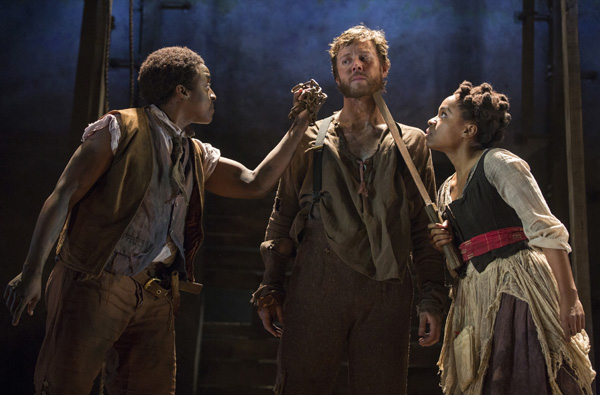The Liquid Plain

(© Joan Marcus)
In 1789, Captain James De Wolfe, of the slave ship Polly, ordered a female slave suffering from smallpox to be strapped to a chair and lowered into the Atlantic. According to the testimony of one of his sailors, John Cranston, "All he said was he was sorry he had lost so good a chair." This grisly true story is the inspiration for The Liquid Plain, a new play by Naomi Wallace (And I and Silence) now making its New York debut at Signature Theatre. Unfortunately, in subjecting this history to her considerable (and misguided) imagination, Wallace does much to dishonor this mostly forgotten tale and the nameless woman at its center.
While the specter of that woman is a character (played by Tara A. Nicholas, doing her best with a thankless and voiceless role), The Liquid Plain revolves around her imagined sister, Adjua (Kristolyn Lloyd). The lights come up on Adjua and her transgender lover Dembi (the convincingly butch Ito Aghayere), both runaway slaves. Dembi binds his breasts in order to pass as a man. They live on a dock in Rhode Island, waiting to book passage back to Africa. When a half-drowned John Cranston (Michael Izquierdo) washes up on their dock, matters become more complicated and Dembi becomes a whole lot more possessive. "That's the last time you say my woman's name. Swine," Dembi spits in a fit of jealousy. Yet more men keep coming to doubtlessly utter Adjua's name: Balthazar (Karl Miller) is a poor sailor who was hired to kill Cranston. Liverpool Joe (the magnetic Johnny Ramey) is the adventurous man who will captain their ship. Improbably, they all plan to sail back to Africa on a vessel christened The Leak.
While Wallace lacks in dramatic efficiency, her sense of the grotesque needs no supplement. Cranston spends the entire play with a parasitic worm bulging from his leg. A corpse animated by the spirit of Romantic English poet William Blake (Karl Miller, playing dead better than any actor I've yet encountered) complains of rapidly detaching appendages. When Adjua's daughter Bristol (LisaGay Hamilton) shows up in the second act (set 46 years later) she meets Cranston and the two soon begin to trade horror stories:
"Two weeks into the voyage, a lady gave birth to half a child. Both of them were thrown overboard," she shares.
"I've cut an abscess the size of your fist from my own gut and sewed it back up myself, without blackin’ out," he counters.
Bristol is the victor of this apparent gross-off and with good reason: She's a woman on a mission. She has returned to Rhode Island to murder De Wolfe (Robert Hogan), who is now a wealthy senator. Finally, it seems as though we're going to see some genuine dramatic sparks fly. But instead of digging into this scene, Wallace throws it away, instead opting to give space to a critique of Poussin's Arcadian Shepherds. In this moment, The Liquid Plain manages to be simultaneously pretentious, dramaturgically sloppy, and boring.
Even under the steady direction of Kwame Kwei-Armah, this play refuses to crackle. Paul Tazewell's distressed period costumes help fill out Wallace's underwritten characters. Riccardo Hernandez's maritime set of planks and rope gives us an immediate sense of time and place. Alex Koch projects Wallace's scene titles on the upstage wall during transitions, as if we were reading a novel rather than seeing a play. The only thing keeping us awake is the grasping sensationalism in Wallace's text.
It is one that exhibits an irritating fetishization of the oppressed. It ticks off the correct boxes (women, slaves, trans people) and then dresses up this confluence of the subjugated as "erased history." And since it was erased, we can never ask Wallace about her sources, quite conveniently. Worse yet, in eschewing historical accuracy for an imagined past, The Liquid Plain does more to obscure the countless real slave narratives that have been suppressed throughout our history.
There is undoubtedly a compelling drama in the story of John Cranston, James De Wolfe, and the woman he savagely killed, but The Liquid Plain isn't it. If Wallace's goal was to impress upon her audience this very true (but mostly unknown) history, she would have done better to pen a play that wasn't so instantly forgettable.











